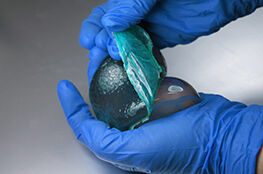Masks for Orthopedic Devices
Manufacturers of orthopedic prostheses engage in manufacturing processes that often require masking materials for temporary surface protection. Components such as hip joints, knees, bone plates, and spinal implants possess both highly polished surfaces and rough, coated surfaces. Protection of one surface is always needed during the processing of the other. The delineation between these surfaces must be absolute. The masking material must provide flawless performance from edge to edge, and component to component.
Similar to aerospace and power generation industries, orthopedic prostheses manufacturers typically rely on traditional masking materials that include tapes and re-useable boots. The protection provided by these materials can be somewhat inconsistent, which has a direct impact on component rework and scrap. Boots tend to loosen over time, and tape edges can become compromised from aggressive grit blasting processes. Upon removal, tapes can also leave adhesive residue on surfaces that requires additional cleaning.
Panacol offers an alternative to traditional masking materials and methods. Highly resilient masking materials incorporating UV light curable technology are available for temporary surface protection of orthopedic devices. They are formulated to withstand high velocity impact of organic media, glass bead, and aluminum oxide. The UV masks’ resiliency and strong adhesion prevents edge lift, which preserves the integrity of the surface being protected. Panacol UV masking materials can be easily dispensed on surfaces by manual methods or through automated dispensing systems. Once dispensed, the liquid masking material is cured (hardened) in seconds using a UV light source. This dramatically reduces labor hours, and allows masking to be incorporated as an in-line process for continuous production flow.

Panacol UV masking materials are being used to protect surfaces of orthopedic devices during processing operations.
UV curing equipment:
UV system solutions with Panacol uv adhesives and innovative curing systems from Honle
Download Brochure:
Panacol-USA UV masking materials for orthopedics are designed for removal by peel. The peeling process can be accelerated by incorporating a quick hot water dip/rinse prior to peel. Hot air may also be utilized if it is practical for the application. Elevating the temperature of UV peelable masks causes them to become more elastic and easier to remove. No residues are left behind, which is critically important in orthopedic component manufacture. Multiple viscosities of each mask are available to accommodate various dispense methods. They may include dip, spray, or hand application using syringes. The masks are offered with a color additive to provide surface contrast for better visibility of coverage during dispensing and removal.
Please view the UV masking materials listed below for a possible candidate for your orthopedic prostheses application. Please contact Applications Engineering at Panacol-USA to confirm your product selection and to secure additional application assistance. Samples of the UV masks can be requested along with UV curing recommendations. In the event that these standard products do not satisfactorily address your performance requirements, Panacol-USA may be able to develop a custom masking material that is specifically tailored to the complexity of your application.
| Masking Material | Viscosity [mPas] | Base | Properties | Removal Method |
|---|---|---|---|---|
| Vitralit® MASK 20100 | 200-400 | acrylate | Moderate adhesion, water soluble mask, dissolves in hot water | Dissolve in hot agitated water |
| Vitralit® MASK E-20102-G | 8,000-15,000 (Rheometer, 25 °C, 10s^-1) | acrylate |
Green color, high adhesion, durable |
Peel after hot water soak (2-3 minutes @ mininmum 176°F/80°C) |
| Vitralit® MASK 20102-G-Gel | 50,000-70,000 | acrylate |
High viscosity, green color, thixotropic gel version of Vitralit MASK 20102-G |
Peel after hot water soak (2-3 minutes @ minimum 150°F/65°C) |
| Vitralit® MASK 20104 | 14,000-17,000 | acrylate | Translucent, moderate adhesion | Peel @ room temperature |
| Vitralit® MASK 20107 | 40,000-60,000 | acrylate | Moderate adhesion | Peel after hot water soak, 2-3 minutes @min. 122°F/50°C |
| Vitralit® MASK 20109 | 15,000-40,000 | acrylate | Low adhesion | Peel @ room temperature |
| Vitralit® MASK 20117 | 20,000-30,000 | acrylate |
Very high adhesion, peelable mask, green color |
Peel after hot water soak (2-3 minutes @ minimum 150°F/65°C) |
To download the technical datasheets (TDS) please click on the adhesive name.